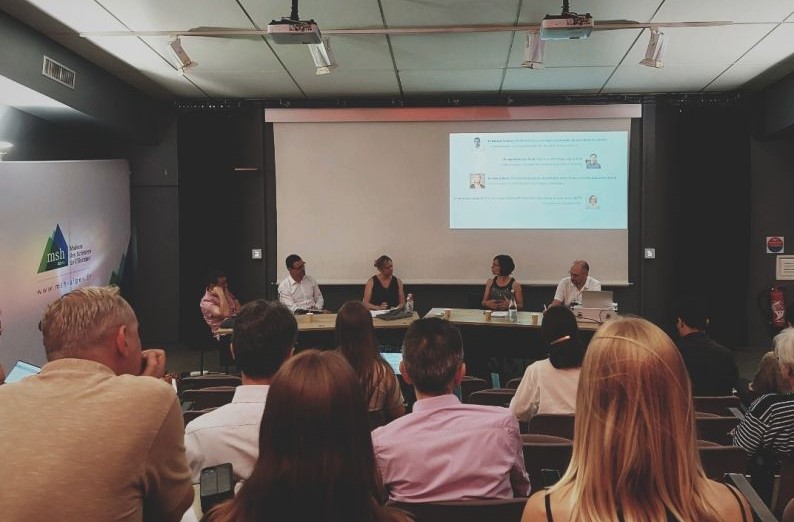- Share
- Share on Facebook
- Share on X
- Share on LinkedIn
Seminar
On June 28, 2023

On June 28, a seminar was held jointly organized by the PACTE (Odenore) and HP2 laboratories. It was an opportunity to share the initial results of the SOCIO-SAS project, a transdisciplinary study aimed at gaining a better understanding of the sociological factors impacting therapeutic compliance among patients with sleep apnea syndrome. Physicians, sociologists, homecare providers and biostatisticians met to exchange and share their respective points of view on the obstacles to treatment compliance and the potential levers for improving patient support in the management of their pathology.
Firstly, Dr Renaud Tamisier, pulmonologist at CHU Grenoble Alpes and co-director of the HP2 laboratory, addressed the issue from a medical perspective. He began by pointing out the proven efficacy of continuous positive airway pressure (CPAP) in treating sleep apnea syndrome, with direct positive feedback on symptoms that can be monitored on a daily basis via a connected watch. Despite this efficacy, however, there is a diversity of responses to treatment, with 20 to 30% of non-adherents after 3 years of treatment. Dr. Tamisier stressed the importance of phenotyping patients in order to better understand the lifestyles that disrupt compliance. Ultimately, this would enable doctors to adopt a more individualized approach tailored to each patient.
Secondly, Jean-Christian Borel from Agir à Dom spoke of the significant role played by homecare providers in supporting patients in France, and the tools they use to monitor compliance with CPAP. They provide both face-to-face monitoring at the start of treatment (three visits are made in the first four months) and remote monitoring. Remote monitoring has been authorized since 2018 and is used by the majority of patients (98% give their agreement). This now makes it possible to remotely alert patients when treatment disruptions are detected. However, these alerts are still difficult for providers to interpret. Involving peer helpers in this follow-up could be an interesting avenue.
Finally, Héléna Revil, a sociologist at the PACTE laboratory and Scientific Director of Odenore, analyzed the issue of medication compliance from a sociological perspective, and presented initial feedback from interviews conducted as part of the SOCIO-SAS study. In particular, she stressed the importance of looking at the personal factors that can lead patients to stop taking their medication. In fact, a number of factors can influence individual experiences and lead to patient resistance to treatment: a complex relationship with CPAP equipment, non-medical benefits, a reduced sense of risk, etc. What's more, with the development of monitoring tools, the responsibility for managing the disease and the treatment falls a fortiori on the patient, and can be a burden that is not always well accepted. Improving the technical performance of therapeutic equipment is not always enough to encourage compliance.
Following these presentations, a round-table discussion was held on the added value of interdisciplinarity and collaboration between experts in this field. A number of proposals were put forward to encourage patient compliance: shortening the time it takes to obtain a consultation, the use of new Sunrise sensors to accelerate management, medical support that takes into account patient motivation, etc. The remainder of the SOCIO-SAS study should provide physicians with new answers to the key question of how to improve patients' health trajectories.
For more information on the Chaire E-Santé and the SOCIO-SAS project Click here
Date
Localisation
Maison des Sciences de l'Homme-Alpes
- Share
- Share on Facebook
- Share on X
- Share on LinkedIn